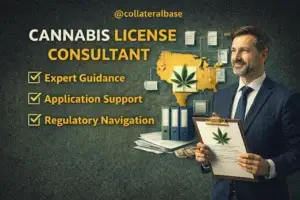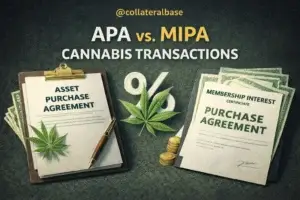Want a Rhode Island Cannabis Dispensary License in 2025? Rhode Island is finally opening up its adult-use  cannabis retail program, offering 24 new dispensary licenses across three license types in 2025. With only 5 licensed dispensaries currently operating and a robust network of 57 licensed growers/processors already in place, this development creates a rare and highly valuable opportunity for aspiring retail cannabis entrepreneurs.
cannabis retail program, offering 24 new dispensary licenses across three license types in 2025. With only 5 licensed dispensaries currently operating and a robust network of 57 licensed growers/processors already in place, this development creates a rare and highly valuable opportunity for aspiring retail cannabis entrepreneurs.
In this in-depth guide, we’ll explore How to open a dispensary in Rhode Island and what makes the Rhode Island market so attractive, the various license types available, key geographic constraints, social equity provisions, compliance requirements, and advanced strategies to help you stand out in a competitive lottery-based licensing process. By the end of this guide, you’ll have a roadmap for how to build a winning team, secure the right property, and navigate Rhode Island’s cannabis regulations step-by-step.
Why Rhode Island Is the Smartest Cannabis Play in New England
-
Limited Supply Meets Growing Demand
-
Minimal Retail Competition: As of 2025, there are just 5 operating dispensaries for a population of over 1.1 million. This imbalance suggests a strong market for new entrants.
-
Retail-Only Opportunity: Unlike some states that open up both cultivation and retail, Rhode Island’s newest round addresses retail licenses exclusively. Cultivation licenses remain capped.
-
Relative Ease of Entry: Although you must still meet strict compliance and disclosure requirements, there is no complex merit-based scoring. The state uses a publicly observed lottery among “qualified” applicants.
-
-
Significant Upside Potential
-
Only 24 Dispensary Licenses in 2025: Rhode Island’s forthcoming licenses are divided among three categories—general (12), social equity (6), and workers’ cooperative (6). A limited supply of licenses often leads to strong business valuations once operational.
-
High Value for Retail-Only Licenses: Focusing on retail dispensaries can be more straightforward than also having to cultivate. Retailers often see quicker revenue generation and simpler business models, especially when the broader supply chain is already in place (57 cultivators/processors).
-
Targeted Market Conditions: New England’s cannabis landscape features multiple states with either saturated markets (e.g., Massachusetts) or partial legalization (e.g., medical only in some states). Rhode Island stands out for its moderate size, low competition, and growing consumer acceptance.
-
-
Regulatory Stability
-
Cannabis Commission Oversight: Rhode Island’s Cannabis Control Commission is tasked with implementing final regulations under the Cannabis Act, ensuring consistent oversight and compliance rules.
-
Predictable Lottery Process: The rules set forth in the final regulations (effective May 2025) detail a clear lottery procedure for awarding licenses. Once you pass the qualification threshold, your selection is randomized, meaning no subjective scoring panels.
-
Key Dispensary License Types in 2025
Rhode Island will issue 24 new retail licenses across three categories:
-
General Dispensary Licenses
-
Total Available: 12
-
Who Can Apply: Any U.S. citizen or legal resident over 21 who meets disclosure and background check requirements (no disqualifying felonies).
-
Fees:
-
Application Fee: $7,500 (non-refundable)
-
Annual License Fee (if selected): $30,000
-
-
Insights: Most applicants will likely compete in this category unless they can qualify for social equity or workers’ cooperative status. While there is no discount on application fees here, the advantage is that eligibility criteria are not as restrictive as in the social equity tier.
-
-
Social Equity Retail Licenses
-
Total Available: 6 social equity Rhode Island Cannabis Dispensary Licenses
-
Who Can Apply: Individuals or teams that meet Rhode Island’s social equity criteria, typically involving residence in “disproportionately impacted census tracts,” certain income or prior arrest records, or track records of economic empowerment.
-
Fees:
-
Application Fee: Waived for the first 6 social equity licenses
-
Annual License Fee: Waived entirely in Year 1, then $7,500 in Year 2, $15,000 in Year 3, $22,500 in Year 4, and $30,000 by Year 5.
-
-
Big Advantage: Each qualified social equity applicant can submit up to six (6) entries at no cost. This considerably increases the odds of being selected in the lottery. Expect heavy interest, given that it’s literally free to apply multiple times if you meet the social equity standards.
-
-
Workers’ Cooperative Retail Licenses
-
Total Available: 6
-
Who Can Apply: State-registered workers’ cooperatives properly organized under Rhode Island law. Cooperative applicants must provide extensive details about their governance, profit-sharing, and staffing models.
-
Fees:
-
Application Fee: $7,500
-
Annual License Fee: $30,000
-
-
Requirements: Applicants must submit job descriptions, member/employee agreements, cooperative bylaws, and demonstrate compliance with R.I. Gen. Laws Chapter 7-6.2 (the state’s cooperative law).
-
Challenges: Co-ops face more documentation and operational structure requirements. However, for those willing to adopt a cooperative model, the pool of competitors may be smaller.
-
Timeline and Milestones (Q2–Q3 2025)
-
May 1, 2025: Effective date of final cannabis establishment rules.
-
June 2025: Application portal likely opens.
-
July 2025 (TBD): Anticipated application deadline.
-
August 2025 (TBD): Lottery drawings for qualified applicants.
-
September 2025: Formal license awards to lottery winners who pass final checks.
-
Q4 2025: Expected first launch of new adult-use retail operations.
Remember: This is an approximate timeline. The Rhode iIsland cannabis license application may not come out exactly when we predict, but it is coming. The Commission reserves the right to adjust application windows and the number of available licenses based on market trends, public health, and administrative readiness.
Geographic Zones
Rhode Island is divided into multiple geographic zones for retail licensing. Notably:
-
Each applicant can only submit one application per zone.
-
If you are selected in multiple zones, you must pick one zone and forfeit the others.
-
Some municipalities may have opted out via local referendum, meaning no dispensaries can open there. Research local stances well in advance.
Because of these zone restrictions, serious contenders often create carefully structured entities to apply in multiple zones. Each entity must have genuinely distinct ownership or controlling members to avoid running afoul of the “one application per zone per entity” rule.
Detailed Rhode Island Cannabis License Application & Compliance Requirements
All dispensary license applicants must provide comprehensive details to the Commission. Important elements include:
-
Corporate Structure and Governance
-
Articles of incorporation or organization, plus a valid certificate of authority to do business in Rhode Island.
-
Organizational chart listing all officers, directors, managers, and members.
-
Nonprofit compliance documents for compassion centers (if converting to hybrid), or cooperative documents for the workers’ co-op route.
-
-
Business Plan
-
Must articulate your startup budget and operating capital.
-
Show clear financial statements or proof-of-funds for equity sources, debt commitments, or lines of credit.
-
Provide an estimated timeline for operational launch (often 9 months allowed before license revocation for non-use, unless you request an extension with good cause).
-
-
Security & Safety Plan
-
Surveillance systems, alarms, secure storage, and robust ID verification procedures.
-
Plans for cash management or electronic payment solutions.
-
Procedures for theft prevention, staff training in safety protocols, and law enforcement liaison.
-
-
Operations Manual
-
Standard Operating Procedures (SOPs) for everything from inventory tracking and record-keeping to packaging and labeling.
-
Recall plan for defective or mislabeled products.
-
Odor mitigation strategies, plus protocols for quarantine and destruction of expired or contaminated products.
-
-
Real Estate / Physical Location Requirements
-
Draft floor plan with labeled areas: storage, packaging, point-of-sale, limited access vs. public waiting rooms, location of cameras, etc.
-
Evidence of local zoning compliance, such as a letter from municipal zoning officials.
-
Distance from schools (500 feet for adult-use) or 1,000 feet for compassion centers, measured from property line to property line.
-
A lease or deed in the applicant’s name, confirming the landlord’s approval of cannabis retail.
-
-
Ownership & Control Disclosure
-
A full list of all owners (down to the individual level in any corporate chain).
-
Disclosure of any financial interests, management agreements, or third-party operational control.
-
Divestiture plan if any ownership or controlling interest is prohibited (e.g., conflicts with other Rhode Island cannabis licenses).
-
-
Criminal Background Checks
-
Required for “key persons,” e.g., any person with managerial control or more than a certain threshold interest in the applicant.
-
Disqualifying felonies typically involve fraud, forgery, embezzlement, or certain other financial crimes.
-
Rhode Island applies a “fair chance” analysis, so not all past convictions lead to automatic disqualification, but full disclosure is mandatory.
-
Understanding the Lottery Selection Process
-
Pre-Lottery Review
-
The Commission determines whether each application meets the “qualified” threshold, verifying completeness and compliance.
-
Only those deemed fully qualified advance to the random selection.
-
-
Random Selection
-
A publicly observed event is held, often in-person with Commission officials.
-
Each zone’s finalists are assigned or placed into a lottery.
-
Social equity applicants who applied 6 times each can appear multiple times in the random draw, though each entity is limited to one successful outcome per zone.
-
-
Multi-Zone Complications
-
If you apply in multiple zones and are selected more than once, you must immediately choose one zone and reject the others.
-
The Commission then draws additional names for any newly vacated zone slots.
-
-
Provisional Approval
-
Winners receive a provisional license.
-
You must fulfill final tasks (securing a certificate of occupancy, completing background checks, paying license fees) before official issuance.
-
Why Social Equity Applicants Have a Major Edge
-
Free Multiple Entries: The ability to submit up to six entries per qualified social equity applicant at zero cost significantly boosts your lottery odds.
-
No First-Year License Fee: This alone saves $30,000 and helps free up capital for construction, staff hiring, or technology expenses.
-
Graduated Fee Increases: By Year 5, you’ll pay $30,000 annually—equivalent to the general tier. But the ramp-up eases cash flow in the early years.
-
Heavy Competition: Expect a flood of social equity applications. People who meet the social equity guidelines may partner with well-financed teams. Be prepared to differentiate your project with strong operations and real estate.
Building a Multi-Application Strategy to Get Edge on the Odds with Compliance
Even though you can only have one zone per entity, many sophisticated groups gunning to open a Rhode Island Cannabis Dispensary License will use separate corporations or LLCs—each with distinct majority ownership—to apply multiple times. However, it is critical to ensure:
-
No Overlapping Majority Control: You cannot present the same controlling owners or managers across multiple zone applications.
-
Legitimate Organizational Separation: Shell or “dummy” structures that share the same physical address, board members, or finances might fail the Commission’s scrutiny.
-
Sufficient Capital: Funding multiple real estate leases and application fees can be expensive. Ensure you have the liquidity to back each submission.
Real Estate and Zoning: Key to Qualification for a Rhode Island Cannabis License
Your ability to lock down suitable retail property can make or break your Rhode Island dispensary application. Because the Commission demands robust proof of site control (lease or purchase) and local zoning sign-off, start early. Potential site selection tips:
-
Municipal Outreach: Some municipalities have been more cannabis-friendly than others. Initiate discussions with local officials to confirm any additional restrictions or hearing requirements.
-
School Zone Distances: Confirm you meet the 500-foot buffer from K-12 properties (adult-use) or 1,000-foot buffer if applying as a medical/hybrid facility.
-
Parking and Access: Ensure your location has sufficient parking (and possibly dedicated spaces for curbside pickup if you plan to request that in your variance).
-
Visibility vs. Security: You want a location easy for adult-use consumers to find, yet not so visible that the general public sees cannabis inventory from the street.
The Power of a Solid Compliance Officer is necessary to open a dispensary in Rhode Island.
Your compliance officer is typically the main point of contact for regulators. They’ll:
-
Oversee adherence to all seed-to-sale tracking requirements.
-
Update the Commission with any ownership or plan changes (via a “variance request”).
-
Organize staff training on ID checks, data privacy, and anti-diversion measures.
Selecting someone with prior cannabis compliance or regulated pharma experience can help demonstrate readiness. Regulators prefer seeing a named individual with actual authority, not a figurehead.
Social Equity Focus: Meeting Qualifications
If you’re pursuing a social equity retail license, thoroughly document your eligibility:
-
Residency in Disadvantaged Census Tracts: Gather proof of address (bills, lease, tax returns) spanning the required years.
-
Prior Cannabis Arrest or Family Impact: Have official court or public records verifying the situation.
-
Economic Empowerment Experience: References or attestations from nonprofit organizations, plus detail on volunteer hours or job responsibilities that specifically served impacted communities.
-
Income Threshold: Show past tax returns to confirm your household income level was below 400% of the median for the relevant area.
These validations take time. Start gathering documents early to avoid last-minute confusion.
What Happens After You Win
If you’re selected in the lottery, you enter a “provisional approval” stage. At this point:
-
Pay the Annual License Fee: $30,000 for general or cooperative, or a waived/discounted fee for social equity.
-
Complete Any Remaining Tasks: If your floor plans changed, request a variance from the Commission. If additional background checks are pending for new investors, finalize that.
-
Obtain Certificates of Occupancy: Show the Commission you meet building and fire codes.
-
Inspection: A final pre-license inspection by Commission staff is mandatory. Expect them to check cameras, alarm systems, storage areas, signage, and the seed-to-sale software.
You then must actively open within a set timeframe to open your Rhode Island Cannabis Dispensary License (often 3 months from license issuance) or risk losing your license for non-use. This is a critical stage where you should have financing, construction, and operational planning well underway.
Launching Your Rhode Island Dispensary
-
Post-License Inspection of Inventory: After sourcing product from licensed cultivators or manufacturers, you may have a second or final inspection to ensure your inventory is correctly tagged and stored.
-
Marketing & Grand Opening: Follow Rhode Island’s advertising rules (no minors in ads, no billboards within certain distances from schools, etc.). Consider hosting a soft opening first to ensure systems run smoothly.
-
Ongoing Compliance & Reporting: Maintain up-to-date SOPs, logs, and staff training. The Commission conducts random and annual inspections.
How Collateral Base Can Help
At Collateral Base, we’ve supported cannabis entrepreneurs in multiple limited-license jurisdictions. Our Rhode Island offerings include:
-
Feasibility Analysis: Assess your group’s readiness for multi-zone applications, particularly for social equity or workers’ cooperative routes.
-
Entity Formation: Structuring multiple LLCs or corporations across zones without breaching the “one application per zone” rule.
-
Real Estate Acquisitions: LOIs, local zoning representation, adjacency reviews for school buffers, etc.
-
Regulatory Strategy: Detailed checklists for each application section, ensuring no missing disclosures or contradictory ownership.
-
SOPs & Compliance Infrastructure: We produce custom manuals that meet Rhode Island’s robust requirements, from security and labeling to inventory tracking.
-
Post-License Launch: Helping you negotiate supply agreements, scale operations, and adapt to rule changes.
Rhode Island Cannabis Dispensary License Tips & Insight
Rhode Island stands out as a “blue ocean” in the often-saturated New England cannabis market. With just five open dispensaries, the 24 new licenses represent a huge expansion. However, competition will be fierce, and the lottery can be unforgiving if your application is incomplete or missing compliance details.
Social equity applicants have a particularly strong advantage given the free application entries, but that also means there could be a deluge of social equity submissions. If you meet the criteria, you’ll still need to finalize real estate, raise capital, and prepare thorough security/operations plans to demonstrate your readiness.
General license applicants face higher financial barriers but can spread out their approach using multiple zone-based entities—if they have the resources to pay application fees and secure real estate in each location. Because each zone allows only limited winners, a multi-entity approach can significantly increase your overall odds.
Final Thoughts and Next Steps
Preparing a Rhode Island dispensary application for 2025 requires meticulous planning, adequate capitalization, and a willingness to adhere to the Commission’s strict operational guidelines. From establishing a bulletproof compliance structure to selecting a prime location that satisfies distance and zoning laws, each detail matters.
Key Tips to Succeed:
-
Start Early: Secure real estate, line up capital, and gather personal/business disclosures well before the application window.
-
Invest in Compliance: A strong compliance plan with a dedicated officer is crucial for both the application and your long-term success.
-
Research Municipal Attitudes: Some towns are more cannabis-friendly than others, and local buy-in can smooth your path.
-
Consider Multi-Entity: For those seeking multiple zone entries, ensure your corporate structures comply with all ownership and control rules.
-
Take Social Equity Seriously: If you qualify, do your homework to submit ironclad documentation for free multiple entries.
If you want expert guidance—whether for a single-zone social equity bid or a multi-entity strategy—reach out to Collateral Base. Our track record includes helping clients secure licenses in highly competitive states, from application drafting to post-award operational consulting. With Rhode Island’s dispensary market poised for expansion, now is the time to position yourself for success.
Good luck on your licensing journey, call a good cannabis lawyer, and may the lottery draw be ever in your favor! If you have more questions or would like to schedule a consultation, contact us today and let’s transform your Rhode Island cannabis dreams into reality.





